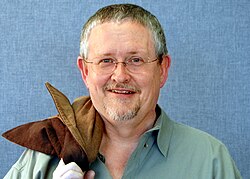Orson Scott Card Quote
The strangest thing about humans is the way they pair up, males and females. Constantly at war with each other, never content to leave each other alone. They never seem to grasp the idea that males and females are separate species with completely different needs and desires, forced to come together only to reproduce Of course you feel that way. Your mates are nothing but mindless drones, extensions of yourself, without their own identity. We know out lovers with perfect understanding. Humans invent an imaginary lover and put that mask over the face of the body in their bed. That is the tradegy of language, my friend. Those who know each other only through symbolic representations are forced to imagine each other. And because their imagination is imperfect, they are often wrong, This is the source of their misery. And some of their strength, I think. Your people and mine, each for their own evolutionary reasons, mate with vastly unequal partners. Our mates are always, hopelessly, our intellectual inferiors. Humans mate with beings who challenge their supremcy. They have conflicts between mates, not because their communication is inferior to ours, but because they commune with each other at all.
The strangest thing about humans is the way they pair up, males and females. Constantly at war with each other, never content to leave each other alone. They never seem to grasp the idea that males and females are separate species with completely different needs and desires, forced to come together only to reproduce Of course you feel that way. Your mates are nothing but mindless drones, extensions of yourself, without their own identity. We know out lovers with perfect understanding. Humans invent an imaginary lover and put that mask over the face of the body in their bed. That is the tradegy of language, my friend. Those who know each other only through symbolic representations are forced to imagine each other. And because their imagination is imperfect, they are often wrong, This is the source of their misery. And some of their strength, I think. Your people and mine, each for their own evolutionary reasons, mate with vastly unequal partners. Our mates are always, hopelessly, our intellectual inferiors. Humans mate with beings who challenge their supremcy. They have conflicts between mates, not because their communication is inferior to ours, but because they commune with each other at all.
Related Quotes
About Orson Scott Card
Card, who is a great-great-grandson of Brigham Young, was born in Richland, Washington, and grew up in Utah and California. While he was a student at Brigham Young University (BYU), his plays were performed on stage. He served in Brazil as a missionary for the Church of Jesus Christ of Latter-day Saints (LDS Church) and headed a community theater for two summers. Card had 27 short stories published between 1978 and 1979, and he won the John W. Campbell Award for best new writer in 1978. He earned a master's degree in English from the University of Utah in 1981 and wrote novels in science fiction, fantasy, nonfiction, and historical fiction genres starting in 1979. Card continued to write prolifically, and he has published over 50 novels and 45 short stories.
Card teaches English at Southern Virginia University; he has written two books on creative writing and serves as a judge in the Writers of the Future contest. He has taught many successful writers at his "literary boot camps".
